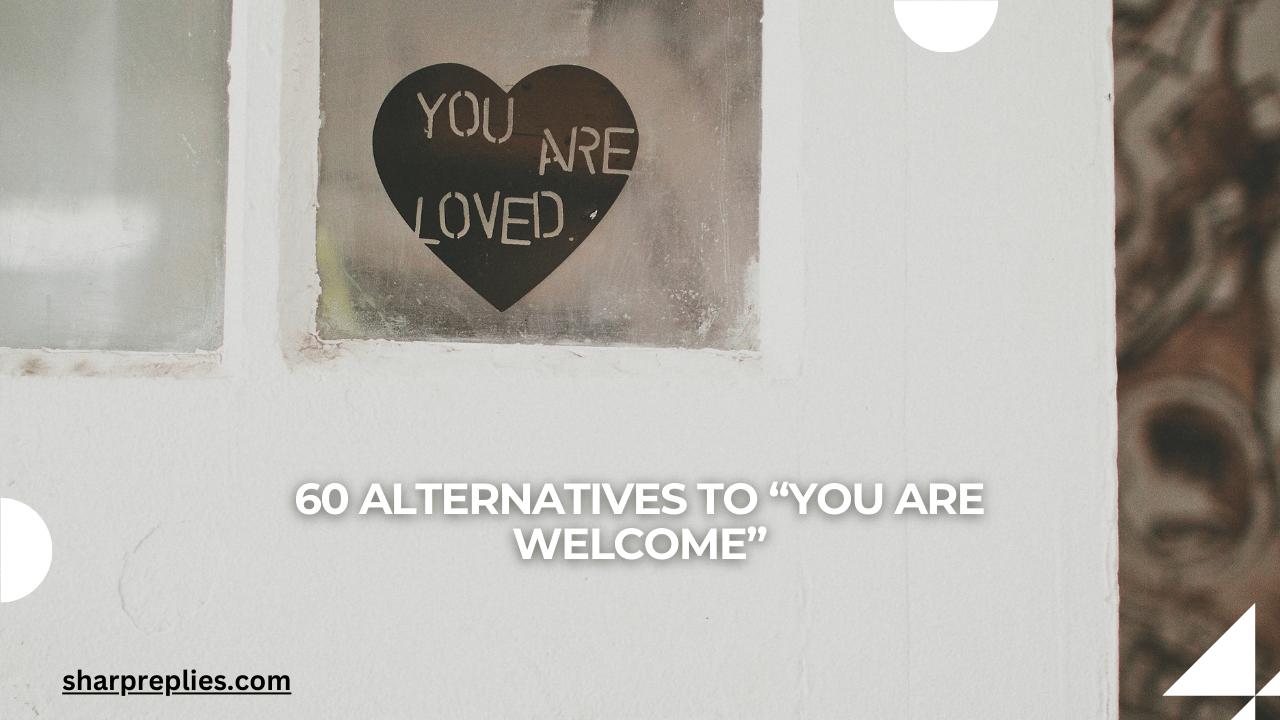We all know the familiar phrase, “You’re welcome”. It’s polite, it’s simple, and it’s the go-to response when someone thanks you.
But what if we told you there are 60 different ways to say it? Language is a beautiful tool, constantly evolving with cultural nuances, social contexts, and personal preferences. Sometimes, breaking away from the traditional responses can make our conversations more engaging, impactful, and even humorous.
This is exactly why exploring alternatives to “You’re welcome” is not only fun but also a practical way to enrich your daily interactions.
Whether you’re aiming to sound more casual, formal, or simply playful, the possibilities are endless. This article will introduce you to 60 creative alternatives to “You’re welcome,” helping you to add variety and spice to your responses.
By the end, you’ll be equipped with phrases that can elevate your conversations, improve social dynamics, and showcase your linguistic creativity. Let’s dive in and see how you can transform your exchanges!
Contents
- 1 The Power of Politeness and Social Etiquette
- 2 Casual Alternatives for Informal Conversations
- 3 Professional and Polite Alternatives for Formal Settings
- 4 Humorous and Playful Responses
- 5 Cultural and Linguistic Variations
- 6 Conclusion:
- 7 FAQ’s
- 7.0.1 Why should I use alternatives to “You’re welcome”?
- 7.0.2 What is the best alternative to “You’re welcome” in a professional setting?
- 7.0.3 Can these alternatives work in different cultures?
- 7.0.4 Are there any alternatives that express humor?
- 7.0.5 Can I use these alternatives in casual conversations?
- 7.0.6 Are these alternatives suitable for all situations?
The Power of Politeness and Social Etiquette
When someone thanks you, you’re not just exchanging words—you’re engaging in a subtle form of social bonding.
The phrase “You’re welcome” is a standard expression of politeness. It has been ingrained in daily conversations for years, but it’s essential to recognize that this common response often lacks personal flair. Why not shake things up a bit?
Polite alternatives can inject a sense of warmth, charm, or even humor into the conversation.
For instance, if you’re in a professional setting, a simple “It was my pleasure” can convey both professionalism and genuine appreciation. On the other hand, if you’re hanging out with friends, you might prefer something like “Anytime!” or “No problem at all.”
These alternatives maintain the polite nature of the interaction while allowing you to add a bit more personality and tone. Language is all about context, and responding with thoughtful alternatives shows that you can read and adapt to social cues.
Casual Alternatives for Informal Conversations
In casual settings, the pressure to respond formally is lifted.
This is the time to experiment with relaxed, easy-going responses that convey a friendly vibe without sounding stiff. “No worries” is a perfect alternative in many situations, whether you’re acknowledging a favor or offering assistance.
It strikes a balance between laid-back and considerate, making it suitable for conversations with friends, family, or colleagues who prefer an informal tone.
Other alternatives in this category include phrases like “Sure thing,” “Of course,” and “You got it!” Each of these responses is cheerful and relaxed, reflecting a sense of comfort and camaraderie.
For example, if a friend thanks you for lending them your book, responding with “No problem!” can make the exchange feel even more personable and less transactional.
Professional and Polite Alternatives for Formal Settings
While informal responses are perfect for everyday interactions, professional settings require a more polished touch. Saying “You’re welcome” is perfectly acceptable in the workplace, but why not elevate your responses to show respect and competence?
Phrases like “It was my pleasure” and “I’m happy to assist” are both professional and warm, suitable for clients, colleagues, or bosses.
In situations where gratitude is expressed in a more formal or business-like setting, you might also consider responses like “I’m glad I could help,” or “It’s my honor to assist.”
These alternatives maintain an air of respectfulness while also showcasing your dedication and willingness to help in a business or formal context. In these cases, the alternatives to “You’re welcome” allow you to come across as confident, yet humble.
Humorous and Playful Responses
Sometimes, you might want to lighten the mood with a bit of humor or wit.
For those times when you’re talking with close friends or family, playful alternatives can make the conversation more memorable and fun. “I live to serve!” or “I got your back” are perfect examples of how you can express your willingness to help with a touch of humor.
Humor is a great tool for strengthening relationships because it makes interactions feel more relaxed and less formal.
If someone thanks you for a small favor, responding with “I’m at your service” or even “What else can I do for you?” can create a sense of playfulness that fosters a friendly and warm atmosphere.
Cultural and Linguistic Variations
The way we respond to gratitude can vary significantly across cultures, and exploring different expressions can open your eyes to how language reflects social norms.
For example, in French, “De rien” (pronounced “duh ree-ahn”) is a common alternative, which translates to “it’s nothing.” Similarly, in Italian, people might say “Prego” when responding to thanks, a term that’s deeply embedded in the culture of Italian politeness.
By learning these alternatives, you can add a touch of global flavor to your vocabulary.
Whether you’re traveling, engaging with people from diverse backgrounds, or simply looking to broaden your linguistic horizon, knowing responses like “Por nada” in Spanish or “Nedaj, nedaj” in Serbian adds a cultural dimension to your conversations.
It shows that you’re aware of different languages and customs, which is often appreciated in multicultural settings.

Conclusion:
Saying “You’re welcome” may seem like a small part of everyday conversations, but how you respond can make a world of difference.
By exploring 60 alternatives, you open up a world of possibilities for more dynamic, engaging, and thoughtful interactions. Whether you want to sound casual, formal, humorous, or culturally aware, there’s a response that fits every situation.
The beauty of language lies in its adaptability, and learning to customize your responses allows you to connect more deeply with the people around you.
So next time someone thanks you, try out one of these alternatives and see how the conversation evolves. Language isn’t just about communicating information—it’s about expressing who you are and how you connect with others. So go ahead, play with your words and add some new phrases to your vocabulary.
Who knows? Your next conversation might just become more memorable than ever before!
FAQ’s
Why should I use alternatives to “You’re welcome”?
Using alternatives to “You’re welcome” helps make your responses more engaging, personal, and contextually appropriate. It adds flavor to your conversations and allows you to express a range of emotions and tones, from formal to humorous.
What is the best alternative to “You’re welcome” in a professional setting?
In professional settings, phrases like “It was my pleasure” or “I’m happy to assist” are excellent alternatives as they are both polite and professional, showing your dedication and courtesy.
Can these alternatives work in different cultures?
Yes! Many of the alternatives explored here have equivalents in different languages, such as “Prego” in Italian or “De rien” in French. Exploring cultural variations in language can enrich your understanding of how gratitude is expressed across the world.
Are there any alternatives that express humor?
Yes! If you want to add humor, responses like “I live to serve!” or “Anything for you!” are playful ways to show you’re happy to help while lightening the mood.
Can I use these alternatives in casual conversations?
Absolutely! Casual phrases like “No worries,” “Anytime,” or “Of course” are perfect for informal settings with friends, family, or colleagues.
Are these alternatives suitable for all situations?
While these alternatives provide a variety of responses, it’s essential to match the tone of your response with the context of the conversation—whether it’s professional, casual, or humorous.








